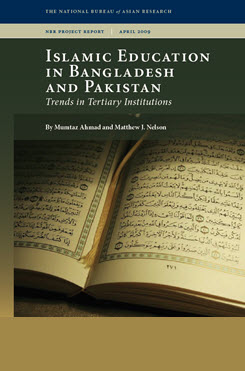Views from the Madrasa
Islamic Education in Bangladesh
This paper examines tertiary-level Islamic education in Bangladesh, providing in-depth analysis of the relationship between madrasa education and Islamist and radical politics.
EXECUTIVE SUMMARY
This paper examines tertiary-level Islamic education in Bangladesh, providing in-depth analysis of the relationship between madrasa education and Islamist and radical politics. The report examines the political consciousness of madrasa teachers and graduate students in Bangladesh, and analyzes their worldviews with regard to the West and the United States. The report reviews student and teacher responses to negative media coverage of madrasa education in Bangladesh while also looking at the alleged connections between madrasas and militancy. The paper concludes with a look at the mushrooming growth of ulama-led non-governmental organizations (NGOs) in Bangladesh.
MAIN FINDINGS
Little evidence links Bangladeshi Quomi madrasas with radical politics or militancy. Those tied with militant activities had largely Alia madrasa and general education backgrounds. The common denominator among those indicted for terrorist activities, furthermore, has been the experience of the Afghan jihad, not madrasa education. While Quomi madrasa students and teachers appear to be largely apolitical, Alia madrasa affiliates are actively involved in partisan politics. Their political affiliations range from the secular Awami League to the centrist Bangladesh Nationalist Party to the Islamist Jamaat-e-Islami. Alia madrasa “agitational” politics is often focused on the so-called “Islamic-political” issues, such as Taslima Nasreen, the alleged “un-Islamic” activities of certain NGOs, enforcement of Shariah laws, and international “Islamic” hotspots. Many students and teachers of madrasas link U.S. engagement in Iraq and Afghanistan, and Israel’s treatment of the Palestinians, among other issues, to the perceived Western anti-Muslim campaign in the name of a war against terrorism. Survey research for this paper revealed that anti-Americanism among madrasa respondents was largely driven by specific U.S. policies, and not due to some inherent Muslim hatred of America; despite their belief that U.S. policies are hurting Muslims “all over the world,” the majority of madrasa respondents surveyed disapproved of “jihad” against the United States.
POLICY IMPLICATIONS
- Madrasa teachers and students fear that the United States uses democracy promotion to interfere in the internal affairs of Muslim countries. Significantly, an overwhelming number of them support democracy and think that truly democratic governments in Muslim countries may end U.S. domination and its negative influences in the Muslim world. They regard democracy as the best way to establish Islamic rule in Bangladesh and believe that Islamic law cannot be introduced through violence and terrorism.
- The growing involvement of the ulama in social welfare and community services through ulama-led NGOs has further strengthened their organic links with local communities, and has provided them with opportunities for more frequent interaction with government officials. Their participation in the modern public sphere has opened up new avenues for them to disseminate their views on issues of socio-religious and cultural concerns to a wider audience.


